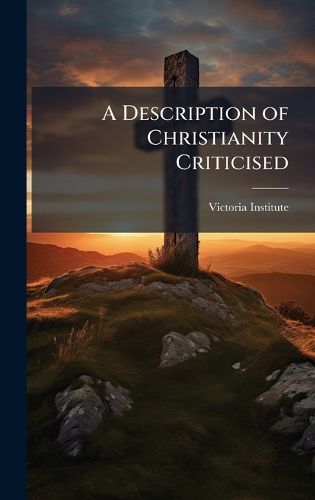Readings Newsletter
Become a Readings Member to make your shopping experience even easier.
Sign in or sign up for free!
You’re not far away from qualifying for FREE standard shipping within Australia
You’ve qualified for FREE standard shipping within Australia
The cart is loading…






"A Description of Christianity Criticised" presents a paper delivered by the late Rt. Hon. the Lord O'Neill at the annual meeting of the Victoria Institute on June 25, 1883. Read by the Lord Bishop of Derry, this pamphlet offers a critique of Christian doctrine and thought, reflecting the intellectual debates of the late 19th century. This historical document provides insights into the intersection of religion, science, and philosophy during a period of significant social and intellectual change in Great Britain.
Part of the Talbot Collection of British Pamphlets, this work offers a valuable perspective on the challenges and defenses of Christianity within Victorian society. Scholars of religious history and the history of science will find this a compelling primary source, capturing a pivotal moment in the ongoing dialogue between faith and reason.
This work has been selected by scholars as being culturally important, and is part of the knowledge base of civilization as we know it. This work was reproduced from the original artifact, and remains as true to the original work as possible. Therefore, you will see the original copyright references, library stamps (as most of these works have been housed in our most important libraries around the world), and other notations in the work.
This work is in the public domain in the United States of America, and possibly other nations. Within the United States, you may freely copy and distribute this work, as no entity (individual or corporate) has a copyright on the body of the work.
As a reproduction of a historical artifact, this work may contain missing or blurred pages, poor pictures, errant marks, etc. Scholars believe, and we concur, that this work is important enough to be preserved, reproduced, and made generally available to the public. We appreciate your support of the preservation process, and thank you for being an important part of keeping this knowledge alive and relevant.
$9.00 standard shipping within Australia
FREE standard shipping within Australia for orders over $100.00
Express & International shipping calculated at checkout
"A Description of Christianity Criticised" presents a paper delivered by the late Rt. Hon. the Lord O'Neill at the annual meeting of the Victoria Institute on June 25, 1883. Read by the Lord Bishop of Derry, this pamphlet offers a critique of Christian doctrine and thought, reflecting the intellectual debates of the late 19th century. This historical document provides insights into the intersection of religion, science, and philosophy during a period of significant social and intellectual change in Great Britain.
Part of the Talbot Collection of British Pamphlets, this work offers a valuable perspective on the challenges and defenses of Christianity within Victorian society. Scholars of religious history and the history of science will find this a compelling primary source, capturing a pivotal moment in the ongoing dialogue between faith and reason.
This work has been selected by scholars as being culturally important, and is part of the knowledge base of civilization as we know it. This work was reproduced from the original artifact, and remains as true to the original work as possible. Therefore, you will see the original copyright references, library stamps (as most of these works have been housed in our most important libraries around the world), and other notations in the work.
This work is in the public domain in the United States of America, and possibly other nations. Within the United States, you may freely copy and distribute this work, as no entity (individual or corporate) has a copyright on the body of the work.
As a reproduction of a historical artifact, this work may contain missing or blurred pages, poor pictures, errant marks, etc. Scholars believe, and we concur, that this work is important enough to be preserved, reproduced, and made generally available to the public. We appreciate your support of the preservation process, and thank you for being an important part of keeping this knowledge alive and relevant.